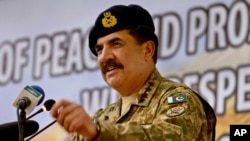Pakistan’s former army chief Raheel Sharif is said to have been appointed first commander-in-chief of a new counterterrorism coalition of 39 Islamic countries led by Saudi Arabia.
Saudi authorities announced the proposed Military Alliance to Fight Terrorism, the IMAFT, in December 2015 to fight Islamic State and other terrorist groups. It will have its headquarters in the Saudi capital Riyadh.
Pakistani Defense Minister Khawaja Asif on Friday confirmed Sharif’s appointment to lead IMAFT. But Sharif and Saudi officials both have since neither confirmed nor denied it.
"I do not know the details. This was finalized only two or three days ago, so I will not comment much on this,” Asif told the private GEO TV.
"Definitely our government's consent must have been part of this," he replied when asked if the decision was made in Riyadh or Islamabad.
Countries such as Egypt, Qatar, the United Arab Emirates, Turkey, Malaysia, Pakistan and several African nations are part of the proposed military coalition.
But Shi’ite Muslim Iran and its allies Syria and Iraq, are not included nor have they supported the alliance.
Islamabad maintains close ties with both Riyadh and Tehran and has long struggled to strike a balance in relations with the two countries.
Iran shares a long border with Pakistan, while Saudi Arabia hosts hundreds of thousands of Pakistani expatriate workers and has often provided oil to Islamabad at deferred payments and extended financial assistance to help the country overcome economic challenges.
Sharif retired in November when his three-year term as the chief of Pakistan’s powerful military ended. Under his leadership, the army launched counterterrorism operations against the Pakistani Taliban and their foreign allies two years ago, leading to a significant reduction in militant violence in the country.
Sharif became highly popular for launching the offenses, prompting public demands for the government to extend his tenure.But his reported decision to join a foreign military coalition has led to severe criticism in Pakistan.
While hardline Shi’ite groups have opposed Sharif’s decision, Sunni hardliners have welcomed it as an honor for Pakistan.
Many former army officers, journalists, analysts and politicians on social media have also heavily criticized the general for the decision, with some calling it “unfortunate” while other termed it against national security of Pakistan.









